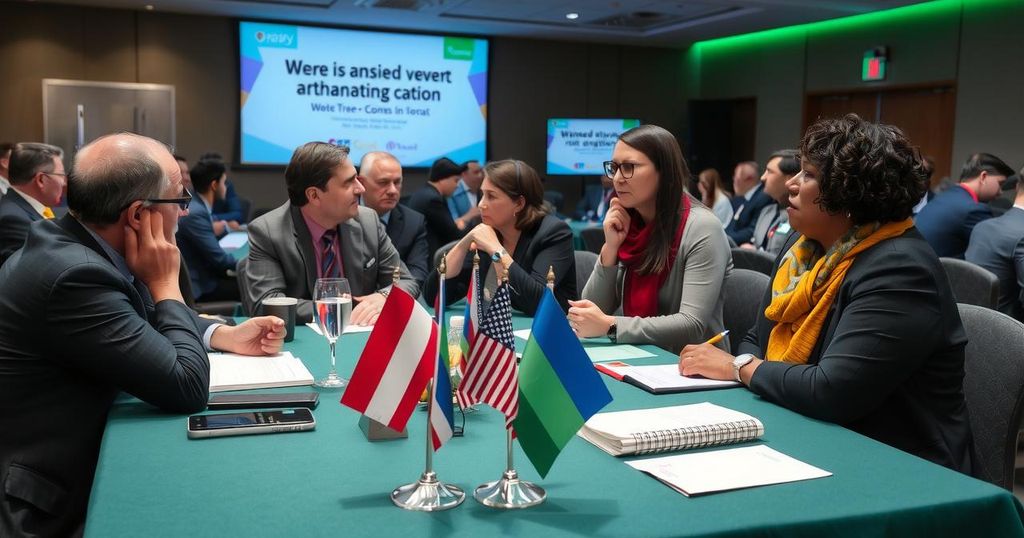The article discusses the significance of storytelling in addressing climate change, as highlighted during COP29 in Baku, Azerbaijan. The author, an educator, reflects on the interdisciplinary work of students at the Climate School, exploring the emotional impact narratives can have on public awareness and engagement. The piece advocates for radical collaboration among artists, citizens, and policymakers to create narratives that inspire climate action and confront the ongoing crisis effectively.
My journey from New York City to Baku, Azerbaijan, site of this year’s UN climate change conference (COP29), spanned over seven thousand miles. I arrived at night, greeted by the colorful flame-shaped towers that characterize this city, once a Soviet Republic and now an oil-rich nation bordering Iran, Armenia, and Russia. Over the course of two weeks, more than 60,000 global leaders, scholars, and civil society members congregated to exchange ideas and negotiated high-stakes discussions among representatives from nearly 200 nations.
As a member of the UNFCCC Entertainment & Culture for Climate Action Film & TV (ECCA) steering committee, I am both an educator and filmmaker deeply invested in examining topics like finance and human migration, while utilizing cultural narratives as a means of addressing climate issues. My course at the Climate School, titled “Climatic Change: Storytelling Arts, Zeitgeist and Our Future,” features a diverse group of students from various disciplines who collaborate to explore complex geopolitical themes concerning climate change. The stories we craft serve to fill a critical gap in the realms of global entertainment and culture, harnessing the power of storytelling to advocate for change across film, television, literature, and digital media.
The importance of storytelling in addressing climate change cannot be overstated; narratives shape behavioral norms, values, and beliefs, allowing audiences to connect emotionally with such pressing issues. Research highlights how stories can enhance awareness and inspire civic engagement far more effectively than traditional news outlets. Many of my students express genuine anxiety over imminent climate impacts in their homeland, witnessing stark realities such as rising sea levels in Mexico and Malaysia as well as extreme flooding in Pakistan. The trauma was underscored when a student lost their childhood home in Houston due to severe weather, while another captured footage of Mexico’s first mandated coastal evacuation.
The 2015 Paris Agreement emphasizes empowering society through education and access to information regarding climate engagement. My students and I analyze how storytelling can shift public opinion and behavior concerning resource extraction and global warming’s pervasive effects. Cultural productions, ranging from independent films to mainstream media, possess unique potential to resonate with audiences on issues of community and agency, evident by the recurrent description of climate as “everything, everywhere, all at once,” a phrase echoed during COP29 and emblematic of both global crisis and opportunity.
At COP29, our Climate School cooperated with other organizations during “Knowledge Day” at the Climate Mobility Pavilion, where discussions centered on displacement and climate-related risks. At this event, Lisa Dale moderated a panel on ensuring dignified relocations for those affected by climate mobility, drawing insights from experts and policymakers, notably voices from the Global South and Pacific Island nations. This discourse aligns with readings from Amitav Ghosh’s work exploring the political dimensions of climate change, which have increasingly polarized public discussion.
A rampant “climate silence” persists in major film industries, including Hollywood, where prior efforts to incorporate climate narratives have been undermined by the fossil fuel lobby’s influence. This greenhushing perpetuates the struggle to forge meaningful connections between climate change and mainstream media portrayals. At COP29, as an ECCA representative, I addressed the necessity for climate storytelling and radical collaboration—terms that encapsulate the interdisciplinary and inclusive approach we strive for in our classroom.
Throughout COP29, I engaged with a diverse array of individuals invested in climate solutions, such as Bridget Kakuwa, a farmer from Botswana, and Teddy Mugabo, Rwanda’s first female CEO of the Green Fund, illustrating various approaches to leadership in climate resilience. As students begin to conceive final projects integrating climate science and popular culture, I observe how vital a multidisciplinary approach is in addressing climate-related challenges. Through collaboration and narrative imagination, we can cultivate human-centered values that support scientific solutions and address resource needs amid ongoing climate crises.
In conclusion, the imperative for artists, citizens, educators, scientists, and policymakers to work together is undeniable. By weaving powerful stories about our climate future, we can aspire to collectively foster healthier societies and a sustainable world for future generations. Such radical collaboration will enable us to confront the climate crisis with shared purpose and vision, ensuring a legacy of resilience for all.
The article reflects on the transformative nature of storytelling as it pertains to climate change, as illustrated during COP29 in Baku, Azerbaijan. With attendance from over 60,000 stakeholders, including leaders and civil society, the conference addressed pressing issues surrounding climate finance, migration, and the role of culture in galvanizing action. The author, an educator at the Climate School, emphasized the need for narratives that can emotionally engage audiences and promote informed climate action. The discourse around climate silence in the entertainment industry and the urgency for radical collaboration among diverse societal actors emerges as central themes.
In summary, the dialogue at COP29 highlights the pressing need for multifaceted collaboration in addressing climate change through storytelling. By fostering an interdisciplinary approach, stakeholders can leverage narratives that resonate emotionally with audiences, driving informed action. As climate-related challenges intensify, the collective responsibility to create impactful stories must be embraced to shape a more sustainable and equitable future. Investing in narrative-driven solutions will aid in the adaptation and resilience necessary for communities facing climate adversities.
Original Source: news.climate.columbia.edu






